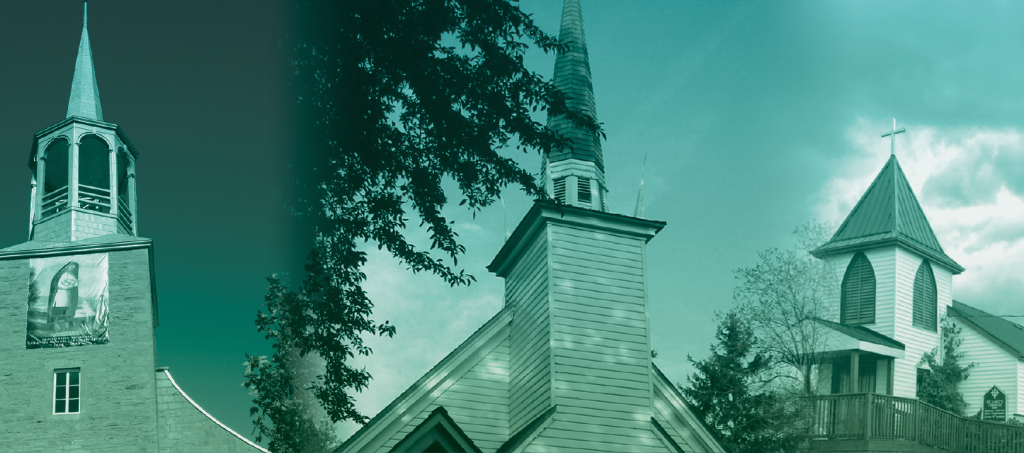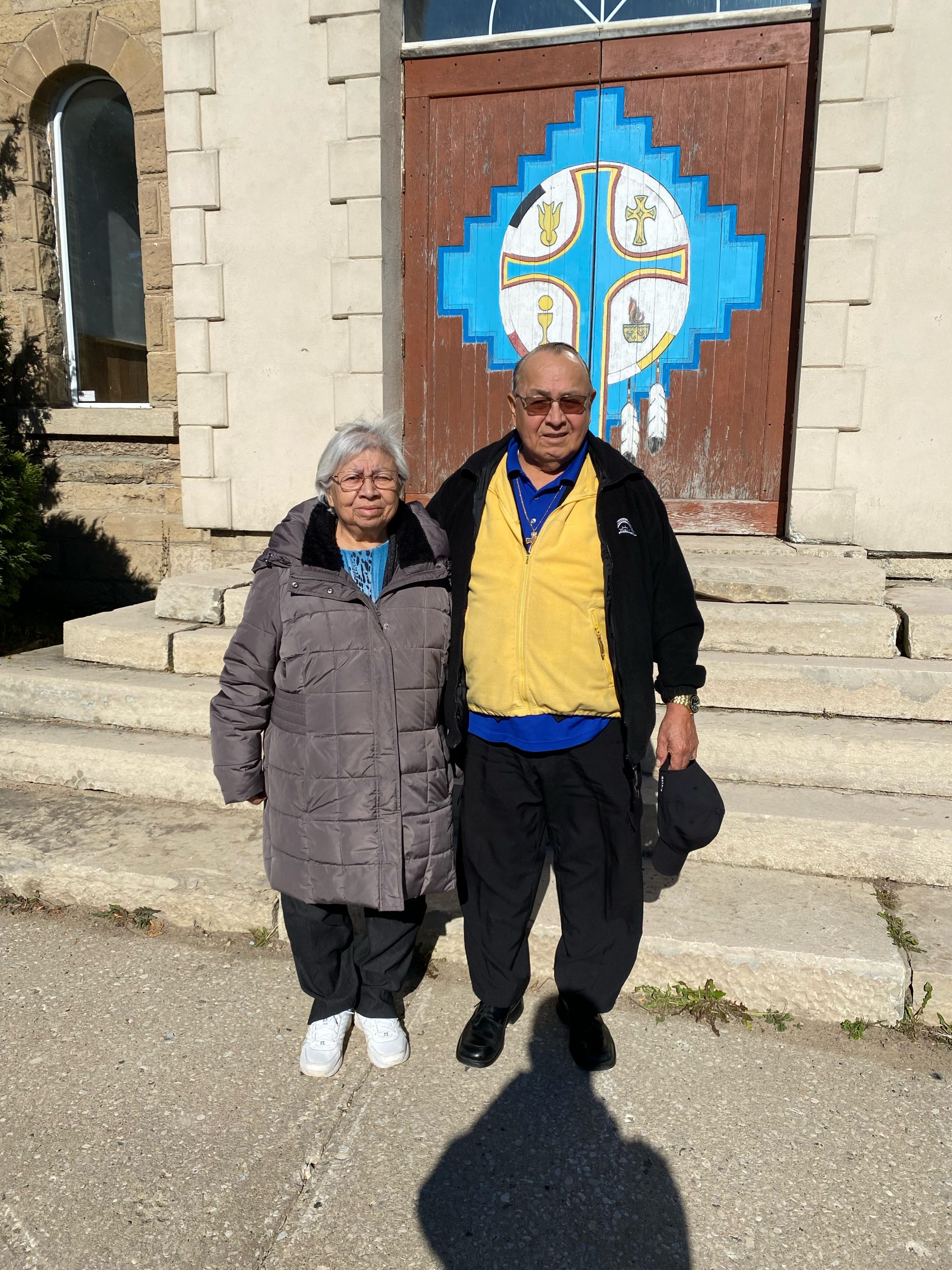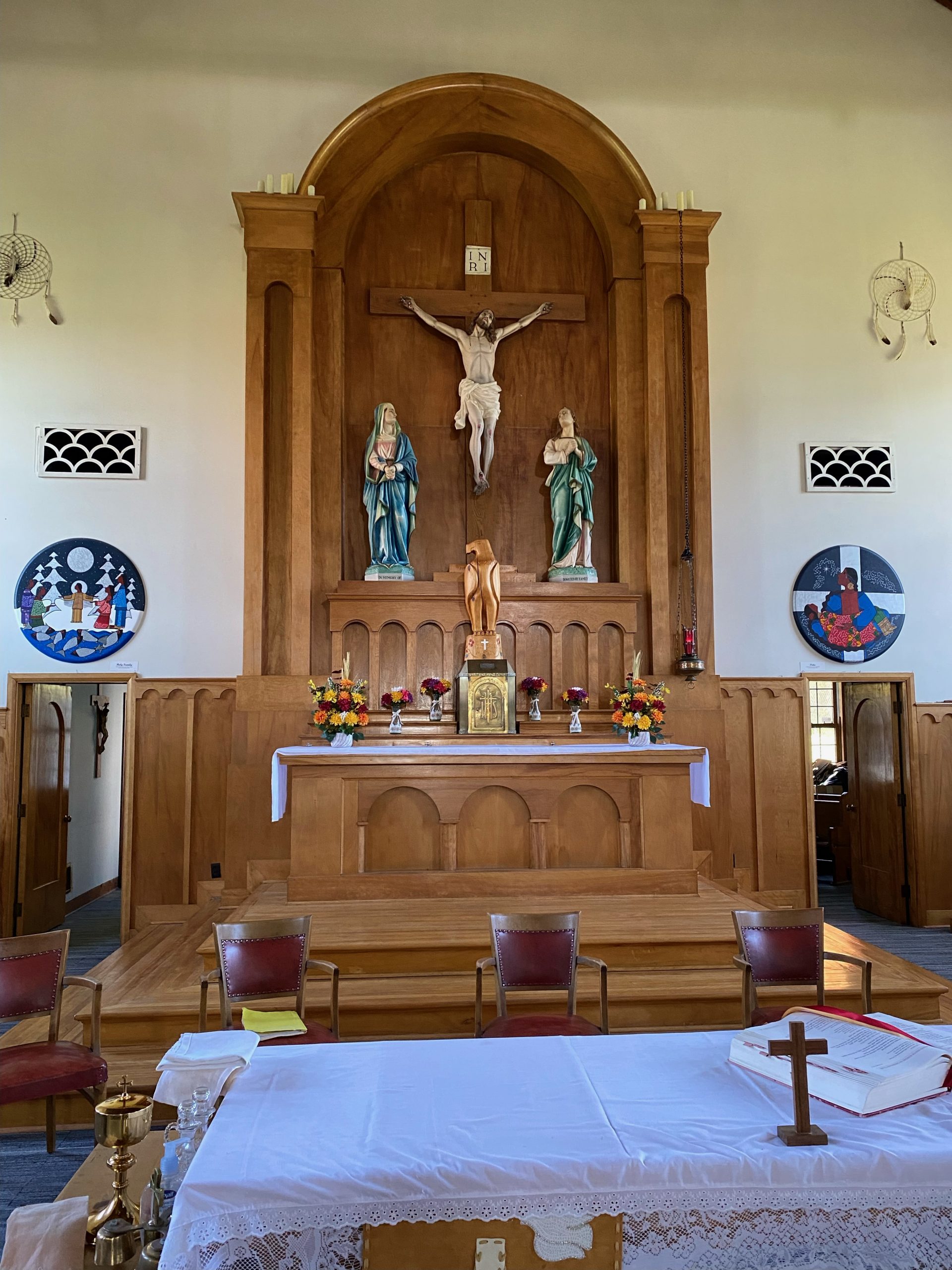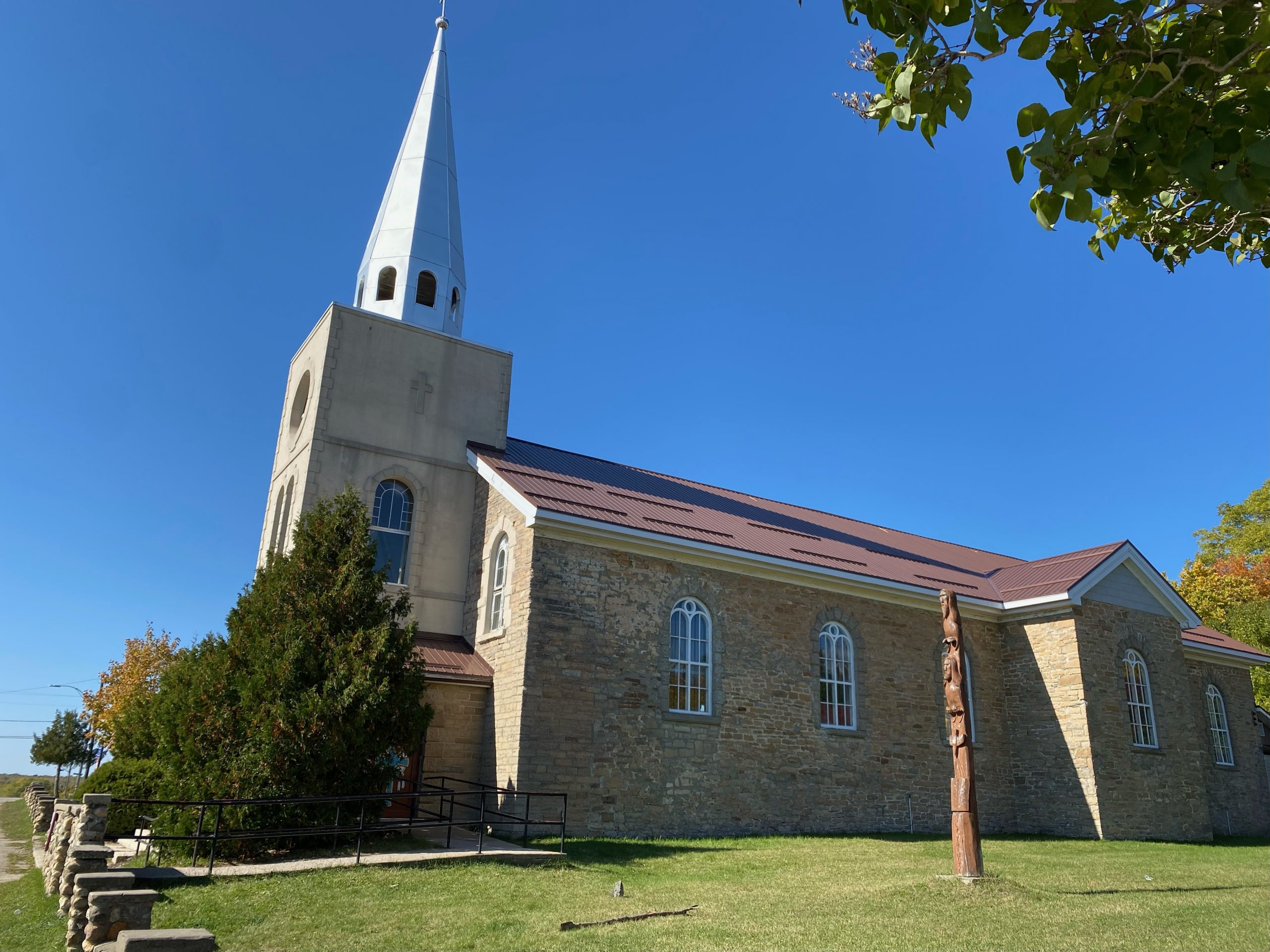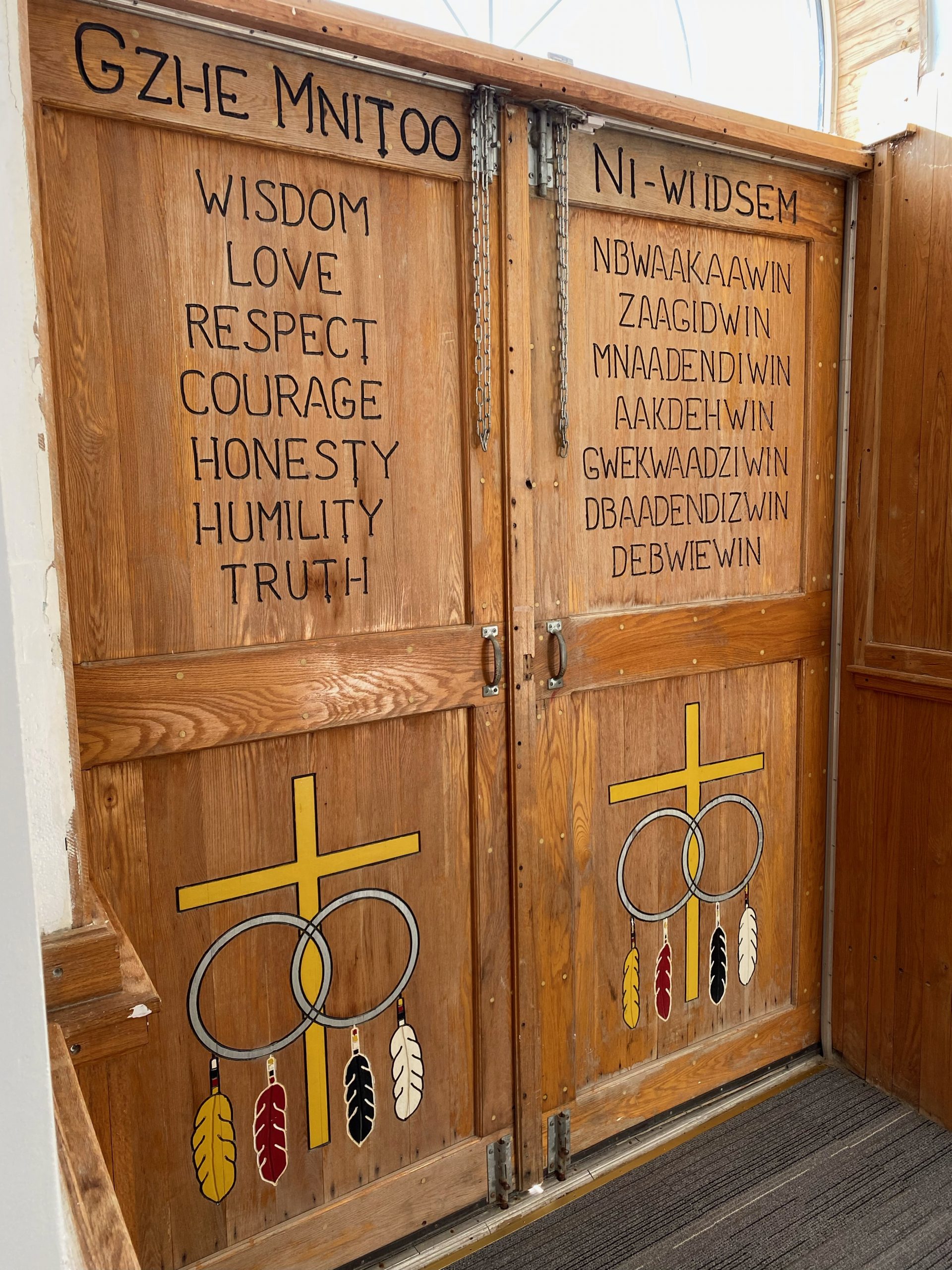Introduction
Indigenous Voices of Faith is a series of interviews conducted by Cardus in the fall of 2022, in which we asked twelve Indigenous people in Canada to tell us about their religious faith and experiences. Since 47 percent of Indigenous people in Canada identify as Christians, Christian voices are the primary but not sole focus of this interview series. The purpose of this project is to affirm and to shed light on the religious freedom of Indigenous peoples to hold the beliefs and engage in the practices that they choose and to contextualize their faith within their own cultures.
Father Deacon Andrew Bennett, program director for Cardus Faith Communities, interviewed Dcn. Gilbert Pitawanakwat in Wikwemikong, Ontario, on October 11, 2022.
Interview Transcript
Fr. Dcn. Andrew: Gilbert, you were born and raised here in Wikwemikong?
Dcn. Gilbert Pitawanakwat: Yes, just as a child. I left here maybe about nine years or ten years old. I went to school in North Bay. So we were boarding there. And then when I finished there, I was two and a half years in Toronto, at George Brown College at the time. I forget what the prior name was. They call it George Brown now, but it had a different name at that time, eh? Anyway, Institute of Trades, that’s what they called it before. Anyway, that’s where I went. And it was in Toronto that I did my work in the plant. So following that, when I got here in 1980 I started to work with the priest in Kaboni. And that was the guy that was charged with that sexual abuse, Father George Epoch. He had a very bad name. Everything was revealed after his death. But all the time I worked with him, I never found anything myself, regarding his offences and stuff.
Fr. Dcn. Andrew: It must have been very hard.
Dcn. Gilbert Pitawanakwat: It was terrible. Just to know what he was up to really. And he was in Cape Croker for a bit. He wasn’t very healthy. He had a heart problem. So, many times he had me step in to do the service when he was away. And so I took it on. I wasn’t ordained yet, but he says, “I’ll pray over you. You just go ahead and do it. I give you permission.” So I just did what he told me, and I covered for him quite a bit. And then, finally, he left, and then he passed away.
But I continued with the other priests that came here, and I worked with them. And that’s where that fourteen years was, prior to my ordination. And then an elder deacon who was here, he was quite old himself. Deacon Angus was his name. He came and approached me back in the 1980s, when he knew I was working with the priest in Kaboni. It was during a blizzard. And I see lights shining toward our house, and I could see this person struggling to get to my house. And that was him, eh? And he says, “Gilbert,” he says, “we’d like you to join us deacons. And would you be interested?” And I says, “Yeah. Well, I’m helping out now. I don’t know what the difference would be.” And he says, “You may have to be ordained.” “Well, let me think about it.” But anyway, I went on and did my work helping the priests.
The deacon program was new at that time, so it was not very popular either. Deacons weren’t recognized. You go in a church, and people walk in, they say, “Oh, Deacon is doing the service,” they would just walk out. It didn’t work, at first. It was hard, eh? And it was like an insult when that happened, eh? And same thing with giving Communion, eh? They said, “No, I don’t want to take Eucharist from a deacon.” They didn’t have any understanding of the role of a deacon. Nobody did. It was new. It was something they hadn’t seen before. And we had struggles, even in my time, that’s years after. I was ordained in ’94. But there were other deacons who were ordained way back. It was in the late ’70s. But they weren’t recognized. So some of them went out to give Communion to the elders. And some elders would refuse. They would say, “No, I’m not taking that from you.”
Fr. Dcn. Andrew: They wanted the priests.
Dcn. Gilbert Pitawanakwat: It was hard. They wanted the priests, yeah. So everything was a struggle. Even smudging was a struggle. People walked out when people smudged, eh? But this was the tradition of the people. It’s cleansing yourself with the sacred medicines. And these sacred medicines were always recognized. But they weren’t practiced, because of the colonial structure that the government had in place over our people. So they’ve had laws where this thing was not allowed. But it came back when the deacons came back. They said, “We have to use what we have. If you want to recognize us in the church, we need to practice some of our own traditions. And you got the Catholic tradition. What’s wrong with my tradition?” And then, of course, some priests said, “We had no business taking away your tradition. No business.” There are all kinds of denominations. And why only with the Native people would you prohibit their traditions? Everyone else is allowed to do theirs.
Fr. Dcn. Andrew: That’s right.
Dcn. Gilbert Pitawanakwat: So, that became a big question. And then the church started to say, “Okay, we need to start working with you people. We need to start to make changes that are appropriate. So we accept your drums, we accept your smudging. Gradually, we’ll accept perhaps even an ordination of a married priest.” And they tried that, but they didn’t get any response from Pope John Paul, eh? Maybe this one, I don’t know if they had approached him over that again, but the other one, though, didn’t allow it, so . . . But they said, “We should allow it,” because of the decline of priests. We don’t have priests filling the shoes anymore. We used to have a priest here for all the churches, at one time. They’re not there no more. There’s only one priest.
And the load’s heavy, eh? The population is not getting smaller. It’s getting bigger. It’s now, I mean, three times bigger. So imagine, we had several priests here for the little population before, where the population has burst at the seams. And then now we only got one priest. And something don’t make sense, eh? But the deacons came in helping out, eh? I cannot imagine Father Paul Robson being on his own at all, including DOSes. DOSes step in much like us, and they do their share of the workload. And much of the fundraising is by the DOSes.
Fr. Dcn. Andrew: What do the DOSes do?
Dcn. Gilbert Pitawanakwat: Ministry, and taking care of the churches, and fundraising.
Fr. Dcn. Andrew: Tell me a bit, Gilbert, about how your Anishinaabe identity relates to your Catholic faith. You have already touched on it in some ways.
Dcn. Gilbert Pitawanakwat: For me, I don’t see a difference. Personally, when people say, “Oh, you’re this. Oh, you’re that.” For me, there’s one God, one God. Whether you pray according to [Anishinaabe] tradition or whether you pray as a Catholic, there is one God. And for me to be a judge on how they pray or, it’s not up to me to be doing that. And the traditional way, I respect that, because what was taken from them has done more harm than what anything can be worth, because people give thanks every day. First thing in the morning, they would offer tobacco, they would offer their prayer, and give thanks for the sunlight, thanks for the trees, the Mother Earth, and the water, and things that give life to us. They are God’s gifts to us. That’s what we receive. And that was the prayer of the Native people. And every time before they planted or harvested, they would offer prayers. It was something very close to their hearts, eh? And when they were told, “No, this is paganism,” it hurt them. It really, really hurt them and did more damage. They were forced to pray in a language they don’t understand. And when Latin was used, nobody understood the prayers. It almost was meaningless. And the priest was facing the other way too, on top of that, in saying Masses, eh? But that’s how they were forced to be in line with the church. And it bothered them. It did bother them.
Whether you pray according to [Anishinaabe] tradition or whether you pray as a Catholic, there is one God.
And anyway, when the language was translated to English, then it was a little bit better, because we have picked up the language, eh? Prior to that, they didn’t understand any of the stuff. Now, today, they make connections. But when they equate the Catholic church practices with the traditional, everything equates, everything. With the Eucharist, for them it was the pipe. The pipe was the connection, and it was through the pipe that everyone shares. That was the Communion. And the smudging, preparing yourself, cleansing your five senses and asking for pardon and asking that no evil spirit will be in your presence as long as you are praying. And the medicines, they knew, for sure, took away the evil spirit, because whenever they experience anything negative or anything that shouldn’t happen in any situation, they always used the smudge and that thing would go away. So they found power in that. They knew it’s there.
And there are so many things that happen that are unexplainable, and they knew what it was. And the sacred medicines were the ones that they held sacred to help them to lift their prayers up to the Creator. It was meaningful and sound for them. And as much as a priest is praying at the altar, it’s the same thing. So they looked at both practices and everything they equated, it’s the same. It’s no difference. Really, there aren’t. What’s wrong with the Catholic people not understanding us? That’s what they’re saying. And it’s true.
But for myself, I was brought up Catholic, because that thing was underground when that happened. And I was brought up Catholic, and I just hung on to it, though I respect these people who practiced tradition. I don’t judge them. I’m not going to judge them either. It’s wrong for me to do that. Who sent me to be a judge of anybody? And when you turn to Scripture, eh, you see all the stuff that it says there about what you should be doing and practicing. It doesn’t match with someone looking over someone’s shoulder and saying, “You shouldn’t be doing that and this.” There’s only one Judge.
But there’s a lot of pressure coming from where it’s said, “Oh, no, no, no, you’re not allowed this.” Well, what are we not to allow? We allow them to do their portion. And Father Doug McCarthy explained it well one time. He says, “If they take away the bread and wine, the Eucharist from me,” he says, “what would I be? I wouldn’t be a priest,” he says. “They take that right away from me.” The government said, “You’re not allowed with the bread and wine at your altar.” “I’m done,” he says. “I’m finished. I’m wiped out.” And he says, “You do the same thing to a Native person when he’s praying with his traditions and how he understands God and how he prays, he says the same thing. You’re taking away everything from them. How is he supposed to pray?”
Fr. Dcn. Andrew: So, do you find these things are better integrated now?
Dcn. Gilbert Pitawanakwat: Yes. It has been needed for a long time. Most of this background stuff has evolved not only with the government but with the Catholic Church, and not only the Catholic Church but with all other churches that were involved, Anglican, Baptist, and whatever. It’s appalling, what happened. It’s very, very simple. But we make it complicated, because we beat around the bushes of other stuff and then say, “Oh, this and that, this and that.” Well, the Native people are very zeroed in. They can see what happened to them. They can see what was done to them. And they get access to this stuff now that they didn’t before. They can go to the archives in Ottawa, and they are given access there because of the legal rights they have. And United Nations is in there, allowing them to focus a lot on their rights, eh? So they’re discovering so much that, even though they know it’s there and even though they’re aware what had happened, a lot of this stuff is not released. But they know it’s there. So when it comes to the point, eh, it’s a dirty shame. It’s a really, really dirty shame. And we don’t deal with it with just a simple, “Oh, we’re sorry.” That doesn’t cut it. There has to be a change, and the church has to recognize the change.
Fr. Dcn. Andrew: What sort of change do you think needs to take place?
Dcn. Gilbert Pitawanakwat: I’ve been at a few ordinations, and the speaker at these ordinations has always said, “We have to start working with First Nations people as a church. We have to. There are no ifs, ands, or buts. We have to make changes, and right now we have to make changes.” I’ve heard this many, many times. I don’t know what changes they’re referring to. Maybe these tiny words that they throw here and there are not a change. What you need to see is a real change in the church. And so that’s the basis of it. For me, personally, I have never had differences. Whether it’s traditional beliefs or Catholic, I have never had differences. For me, it’s one God, whether I pray that way or pray this way. But I don’t judge, I don’t dare judge nobody in their practice. Even Jehovah’s Witnesses, they want to believe what they believe. That’s their right. If they were brought up as a child like that, that’s what they were led to believe and that’s what they follow, eh? And of course, God is the final judge. He’s the one who’s going to say, “You know what you did.” He’s not going to say, “You did wrong because you prayed this way.” That’s how he was brought up. It’s a pure sickness to say, “Well, how you pray is wrong.” You were brought up as a child like that. And same with me, I was brought up as a Catholic. My prayer is always centered on God, not the title or whatever you want to call it. I pray and follow what’s in Scripture and stuff like that. It’s not to say, “Oh, my mind is somewhere else, and I’m going to go and push that guy away from his religion.” That’s not my job. And that’s what I see with the church. The church for so long has been condemning: “What you’re doing is wrong.” And all the books that you read of the intentions behind the stuff that took place, it’s a shame. So now we have to rebuild, because the church has to rebuild itself and recognize what the Natives are telling them.
Fr. Dcn. Andrew: Having just been in the church next door here in Wikwemikong, and then also having been to, for example, St. Francis Xavier Mission in Kahnawake, it seems to me like there’s a really good integration of both Catholic belief and how different aspects of Indigenous culture have been brought into the church and welcomed in the church. They see that there are these parallels that exist.
Dcn. Gilbert Pitawanakwat: Well, that was the colonialism that was there before. That’s how this church started. It was our way, and people caught on with it. That’s how they prayed. And because of the government’s actions still behind it, they were forced to pray that way. Mind you, they know what was being done to them. And now that thing is coming out. That’s what really separates the church now. And it’s at a point where it’s very difficult for both of us, the Catholics and the traditional believers. With all the sexual abuse and with all the knowledge of what they find in the archives and with the government and even with the Vatican, it’s overwhelming.
Now, how do we start to deal with it? Do we deal with it, or does the church deal with it, to reconcile I mean? We’ve been in there with them all along. And now when this is coming out, then something is wrong. And you just cannot wipe it out overnight. They have to see more openness, more integration of both cultures, and an understanding of who they are too. There is discrimination in the church. And inasmuch as the church may say there’s none, that’s very, very wrong, because I, myself, as a deacon, I have seen it among the clergy. Everywhere, I see it. And it’s not only toward Natives. Even among themselves, priests are not doing the right things.
There is discrimination in the church. And inasmuch as the church may say there’s none, that’s very, very wrong, because I, myself, as a deacon, I have seen it among the clergy.
I was invited to an ordination. The priests and the bishops were told, “You guys sit aside over there. You guys sit aside over there. Him [Deacon Gilbert], he’s helping me,” the bishop said. “I invited him. He’s going to help me. You guys sit on the side over there.” They didn’t like that. And a lot of them came to me and they said, “Why were you chosen? How come we’re not part of this celebration?” They were told to sit on the side. And very openly too, they were told, “You sit on the side. This guy’s going to help me with this ordination.” You see that? Why would these bishops feel that way? Why would the priests feel that way? They did. I said, “I have no answer here. You ask the guy up there. I’m not going to argue.” It’s just foolishness to see this in the church.
Fr. Dcn. Andrew: Now you assisted at the papal Mass in Edmonton. What was that experience like for you?
Dcn. Gilbert Pitawanakwat: It’s not something new. I mean it. I’m there to do my job. And my priority is the guy up there.
Fr. Dcn. Andrew: God?
Dcn. Gilbert Pitawanakwat: It’s not so much how we interact or. . . Well, that’s important too, but to be done the right way. But my focus is on the Master himself. It’s not so much this big excitement there and, “I’m going to be seen.” No, none of that. I go there humbly, and I do my work humbly. That’s my faith.
I don’t want to sit up there where it’s high. I would prefer to sit where I don’t want to be seen but still be part of it. But unfortunately, I was called to read the Gospel and to be a participant with bringing the Scripture to the altar and the preparation of the gifts there. That was an honour. But it’s not an honour I look for. It’s serving the Creator, God. That’s my focus. I’m not there because I’m Catholic. I’m there because of God. And if I join the traditional people in their prayer, I’m there for God. I’m not there for their tradition or I’m not there for Catholic tradition. I’m there to praise God and his works. That’s why I’m there.
Fr. Dcn. Andrew: Wonderful.
Dcn. Gilbert Pitawanakwat: That’s how I see life. I’m not there to judge nobody. I’m not there to look down on anybody. And then, when I look at people, I see God in them. I see God in people. Every day I see a lot in people. When I see someone, he’s God-sent. Whether I shake their hands or visit with them, I see God in that person. That’s how I view life. And that’s important to me.
There are so many things that I see are wrong. We were in Sudbury, and we pulled up into a mall, eh? And in that mall, there was a man sitting in the snow. Nothing. He has nothing, barely any warm clothes, and he looked pitiful. He had a cup in front of him. He wasn’t even looking at you. He was just there, humbled, wanting help. So we pulled up. And oh, my gosh, I was so heartbroken just looking at this man. And I told my wife, I says, “We better get some money and help this man out.” So while I pulled my wallet out, she was pulling out her purse, and a cop pulled by really fast and the cop says, “Out of here. Out. I don’t care where you go. Out. They don’t want you here.” He was so brutal with this poor man. We never even had a chance to help him. I was so heartbroken. Why didn’t this cop take this man to a warm shelter place somewhere and get him some food or something . . . These are supposed to be protectors, servants.
And why don’t they find a place where they can rehabilitate, instead of prisons? They put so much money in there, where they can build institutions, where they can train these people for something, and work with them on a probation site somewhere where they can straighten them out of it a bit. But not just like an animal, lock them up in a cage. There’s so much that I see that really disturbs me in society. A lot of times, these people who end up in there are so poor that they go and do something stupid in order to live. That’s survival for them. As a Christian, it breaks your heart. It just really, really does.
Fr. Dcn. Andrew: Thank you, Gilbert, for your thoughts. I very much appreciate your time.
Photos taken by Rev. Dr. Andrew P. W. Bennett.

